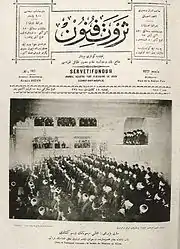Servet-i Fünun
Servet-i Fünun French: Journal Illustré Turc ; ("Wealth of Knowledge" ) was an avant-garde journal published in the Ottoman Empire and in Turkey. Halit Ziya (Uşaklıgil) and the other writers of the "New Literature" (Ottoman Turkish: Edebiyat-ı Cedide) movement published it to inform their readers about European, particularly French, cultural and intellectual movements.[1] In operation from 1891 until 1944, it was for its first year a supplement of the newspaper Servet but became its own publication the following year.[2]
 Edition of 24 April 1908 | |
| Type | weekly newspaper |
|---|---|
| Founded | 1891 |
| Language | Turkish |
| Ceased publication | 1944 |
| OCLC number | 183347868 |
Evangelia Balta and Ayșe Kavak, authors of "Publisher of the newspaper Konstantinoupolis for half a century," wrote that during the late Ottoman Empire it was "[t]he most influential literary journal" which had "a significant role in the intellectual life" of the country.[2]
Other titles of the journal were Uyanış, Resimli Uyaniş, and Terwet-i fünūn.[3]
History
In 1890 20-year old Ahmed İhsan, who later took the family name Tokgöz, translated articles into Turkish for Servet, an Ottoman Turkish newspaper owned and operated by Ottoman Greek Demetrius Nicolaides. Ahmed İhsan suggested having a supplement each week. Servet began running Servet-i Fünûn from 1891 to 1892 with the approval of Sultan of the Ottoman Empire Abdulhamid II after Nicolaides, in late 1890, applied to create a supplement about industry and science. Nicolaides decided to sell the supplement to İhsan as he believed not enough copies were being purchased.[2] Balta and Kavak wrote that relatively little scholarship on Servet-i Fünun describes Nicolaides' initial role and that "The overwhelming majority of scholars acribe the periodical to Ahmed İhsan".[4]
Tevfik Fikret became its editor in 1896.[5] Another prominent member was the poet Süleyman Nazif.
Contents
Halit Ziya's romance novel Aşk-ı Memnu was serialized in the journal in 1899 and 1900. The novel has since been adapted into several television series, the best known of which is the internationally popular 2008–10 series of the same name.
Legacy
Multiple PhD theses and academic articles were dedicated to this publication.[2]
References
- Balta, Evangelia; Ayșe Kavak (2018-02-28). "Publisher of the newspaper Konstantinoupolis for half a century. Following the trail of Dimitris Nikolaidis in the Ottoman archives". In Sagaster, Börte; Theoharis Stavrides; Birgitt Hoffmann (eds.). Press and Mass Communication in the Middle East: Festschrift for Martin Strohmeier (PDF). University of Bamberg Press. pp. 33-. ISBN 9783863095277. - Volume 12 of Bamberger Orientstudien - Hosted at Kooperativer Bibliotheksverbund Berlin-Brandenburg (KOBV)
Notes
- "Servet-i Fünun." Encyclopædia Britannica. 2010. Encyclopædia Britannica Online. 29 June 2010 <http://www.britannica.com/EBchecked/topic/535954/Servet-i-Funun>
- Balta and Kavak, p. 46.
- worldcat.org, Servetifünun haftalık resimli türk gazetes
- Balta and Kavak, p. 57.
- Muhammad Rashid Feroze, Islam and Secularism in Post-Kemalist Turkey, Islamic Research Institute, 1976, p. 116.